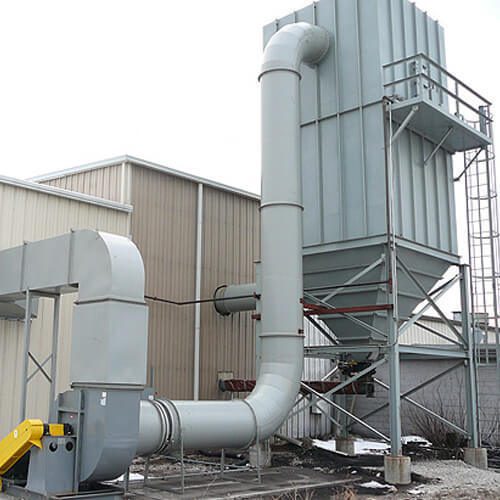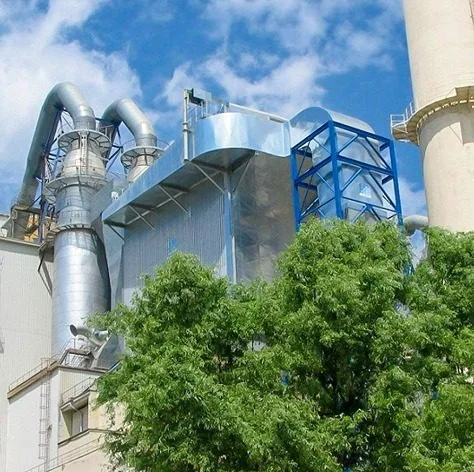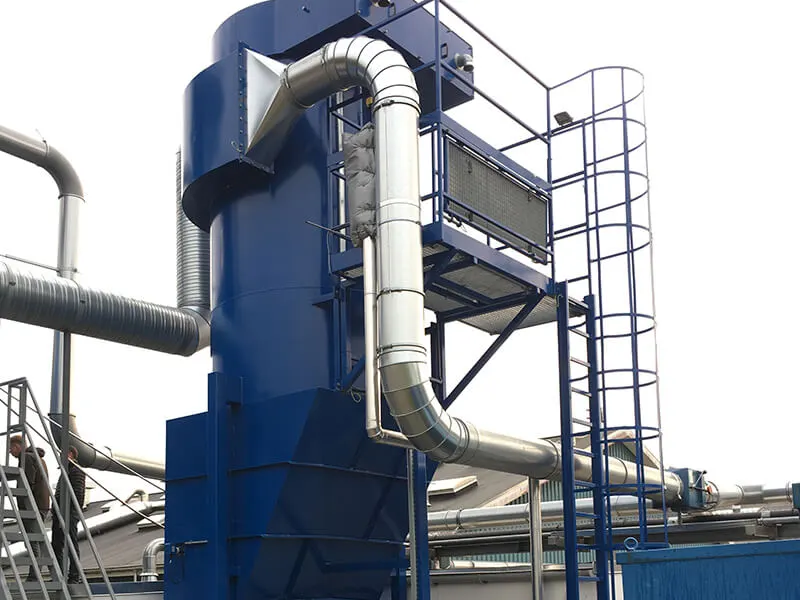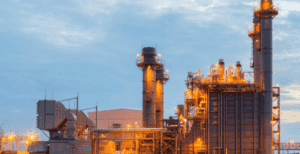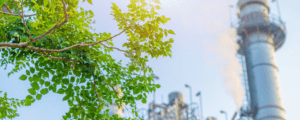In industries handling complex gas streams—such as cement, steel, and chemical manufacturing—effective gas cleaning is essential to reduce emissions and comply with stringent environmental regulations. Multi-stage gas cleaning plants are designed to meet these challenges by combining various filtration technologies, including Electrostatic Precipitators (ESPs), scrubbers, and fabric filters, in a single, integrated system. By leveraging the strengths of each filtration method, these plants provide robust contaminant removal solutions for a wide array of pollutants, ranging from particulate matter to acid gases and heavy metals.
This blog will examine the benefits of multi-stage gas cleaning plants, the unique role of each filtration technology within these systems, and how Intensiv-Filter Himenviro can support industries in adopting and optimizing these advanced gas cleaning solutions to meet their environmental objectives.
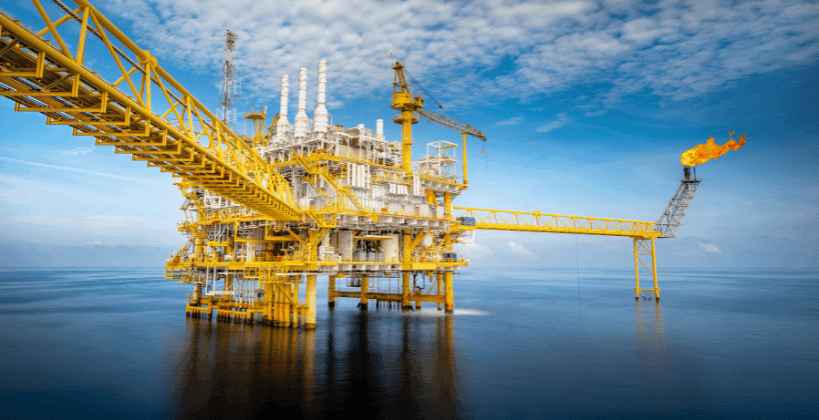
Discover Our Range of Solutions:
Understanding Multi-Stage Gas Cleaning Plants: The Basics
What Are Multi-Stage Gas Cleaning Plants?
Multi-stage gas cleaning plants are advanced filtration systems that combine multiple air purification technologies in a sequential setup. The aim is to target different types of contaminants—solid particulates, aerosols, acidic compounds, and volatile organic compounds (VOCs)—within a single integrated plant. By employing Electrostatic Precipitators (ESPs), scrubbers, and fabric filters together, these systems ensure that the gas stream is thoroughly purified before being released into the atmosphere, effectively reducing the environmental footprint.
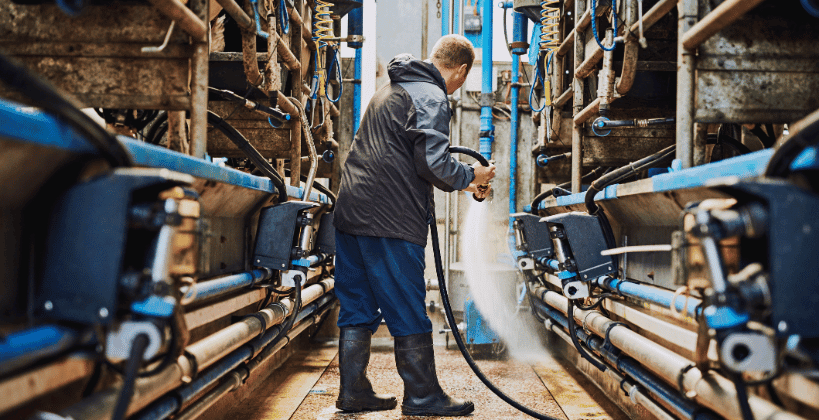
Each stage within the plant has a specific purpose:
- Electrostatic Precipitators (ESPs): Capture and remove fine particles using electric fields.
- Scrubbers: Absorb and neutralize acidic gases and other soluble contaminants.
- Fabric Filters (Baghouses): Capture remaining particulate matter and serve as a final purification stage for maximum efficiency.
Why Use Multi-Stage Filtration?
Single-stage gas cleaning systems are often effective at addressing specific types of pollutants but may fall short in handling diverse contaminants present in complex gas streams. For example, an ESP alone can effectively capture fine particulates, but it may not address acidic gases or liquid droplets. By combining different filtration technologies, multi-stage gas cleaning plants deliver comprehensive air purification, allowing industries to meet stringent regulatory standards while achieving high levels of efficiency.
Benefits of Multi-Stage Gas Cleaning Plants
- Comprehensive Contaminant Removal
Multi-stage systems are designed to target multiple types of pollutants simultaneously, from fine dust to corrosive gases and VOCs. This versatility allows industries to address complex gas streams with varying contaminant types and concentrations, improving overall air quality and environmental compliance. - Enhanced Operational Efficiency
By addressing contaminants in multiple stages, each filtration method within a multi-stage gas cleaning plant can operate within its optimal parameters. This staged approach reduces strain on individual components, leading to increased longevity, reduced maintenance costs, and improved reliability. For industries operating continuously or at high capacities, this results in less downtime and higher productivity. - Adaptability to Changing Regulations
Environmental regulations for air quality and emissions are becoming increasingly stringent worldwide. Multi-stage gas cleaning plants provide industries with the flexibility to adapt to changing standards, as each filtration stage can be customized or upgraded to address new pollutants or meet stricter limits. - Cost Savings Over Time
Although multi-stage gas cleaning plants may require a higher initial investment, their efficiency and longevity ultimately result in cost savings. The reduced maintenance, energy efficiency, and compliance with emission standards help minimize operational costs over the system’s lifespan. - Reduced Environmental Impact
By thoroughly cleaning the gas stream, these systems significantly reduce the release of harmful pollutants into the environment, benefiting both local communities and global ecosystems. Cleaner air emissions contribute to improved public health and reduced environmental degradation.
Connect with us Now
Key Filtration Technologies in Multi-Stage Gas Cleaning Plants
1. Electrostatic Precipitators (ESPs): The First Line of Defense
Electrostatic Precipitators (ESPs) are commonly used in the initial stages of multi-stage gas cleaning plants to capture and remove fine particulate matter. Using an electric field, ESPs charge particles in the gas stream, which then adhere to collector plates. This process effectively removes dust and other particulates without impeding gas flow.
- Advantages: ESPs are highly efficient for particulate matter removal, particularly for fine particles, with minimal pressure drop.
- Limitations: ESPs are less effective for capturing liquid droplets, acidic gases, and VOCs, which require additional filtration methods.
2. Wet Scrubbers: Targeting Acidic Gases and Soluble Pollutants
Following ESPs, wet scrubbers are typically used to remove soluble and acidic gases such as sulfur dioxide (SO₂), nitrogen oxides (NOx), and other pollutants that cannot be addressed by ESPs alone. In wet scrubbers, gas streams are brought into contact with a scrubbing liquid, which absorbs and neutralizes the acidic components.
- Advantages: Wet scrubbers are highly effective for removing gaseous pollutants and provide additional particulate removal. They can also control odors and reduce VOCs.
- Limitations: Scrubbers require a reliable water source and may produce a liquid waste stream that needs to be treated before disposal.
3. Fabric Filters (Baghouses): Final Purification for Maximum Efficiency
As the final stage of the filtration process, fabric filters (or baghouses) capture any remaining particulates in the gas stream. These filters use a series of fabric bags that trap particles as the gas passes through, serving as a polishing step that ensures the highest level of contaminant removal.
- Advantages: Fabric filters provide near-complete particulate removal, making them ideal for industries with stringent emission standards.
- Limitations: While fabric filters are effective for particulates, they are not suitable for gas-phase pollutants, which need to be addressed in previous stages.
How Intensiv-Filter Himenviro Supports Multi-Stage Gas Cleaning Solutions
Customized Design and Engineering for Multi-Stage Systems
Intensiv-Filter Himenviro specializes in designing customized multi-stage gas cleaning plants tailored to meet the specific needs of each industry. Their team of engineers conducts in-depth analyses of gas stream compositions, pollutant types, and industry requirements to create optimal multi-stage solutions. By combining ESPs, wet scrubbers, and fabric filters, Intensiv-Filter Himenviro provides a fully integrated approach that maximizes contaminant removal and ensures compliance with industry regulations.
Advanced Technology and Innovation
Intensiv-Filter Himenviro leverages the latest innovations in filtration technology to improve the performance and efficiency of multi-stage gas cleaning plants. With cutting-edge ESPs, advanced scrubber configurations, and high-performance fabric filters, their solutions offer superior air purification capabilities. Additionally, Intensiv-Filter Himenviro incorporates smart control systems to monitor gas cleaning operations, ensuring continuous, optimized performance with minimal energy consumption.
Maintenance and Lifecycle Support
The company understands that regular maintenance and system updates are essential for maximizing the lifespan and efficiency of multi-stage gas cleaning plants. Intensiv-Filter Himenviro provides comprehensive maintenance services, including scheduled inspections, system upgrades, and technical support. Their team of experts helps clients ensure that each filtration stage operates within optimal parameters, reducing downtime and preventing unexpected operational issues.
Commitment to Environmental Compliance and Sustainability
Intensiv-Filter Himenviro is committed to supporting industries in meeting environmental compliance requirements and achieving their sustainability goals. By implementing efficient, high-performance multi-stage gas cleaning systems, the company helps clients reduce their carbon footprint, lower harmful emissions, and contribute to cleaner air quality. This commitment to environmental responsibility is a core value that aligns with Intensiv-Filter Himenviro’s mission to create a healthier, more sustainable future.
Training and Consultation Services
Implementing a multi-stage gas cleaning plant can be complex, and proper operation is crucial for achieving optimal performance. Intensiv-Filter Himenviro offers training and consultation services to ensure that client personnel are equipped with the knowledge and skills to operate and maintain these advanced systems. By providing ongoing support and expertise, Intensiv-Filter Himenviro enables clients to get the most out of their investment in multi-stage gas cleaning technology.
Conclusion: The Future of Industrial Gas Cleaning with Intensiv-Filter Himenviro
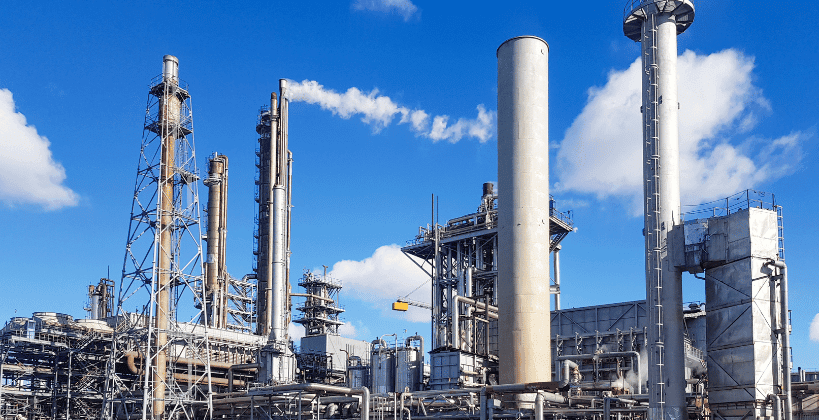
Multi-stage gas cleaning plants represent the future of air pollution control for industries handling complex gas streams. By combining ESPs, scrubbers, and fabric filters, these systems offer unparalleled contaminant removal capabilities, ensuring that harmful pollutants are thoroughly addressed before they can enter the atmosphere.
For industries striving to meet stricter environmental regulations, improve operational efficiency, and reduce their environmental impact, multi-stage gas cleaning plants provide a versatile, cost-effective solution. Intensiv-Filter Himenviro stands at the forefront of this technology, providing customized, high-performance gas cleaning solutions designed to meet the unique needs of each client.
With expertise in multi-stage filtration, a commitment to sustainability, and a focus on client support, Intensiv-Filter Himenviro is the ideal partner for industries looking to achieve superior air quality and environmental compliance. As industries continue to adopt cleaner, greener practices, multi-stage gas cleaning plants offer a practical, impactful solution that aligns with the global drive toward sustainability and environmental stewardship.
